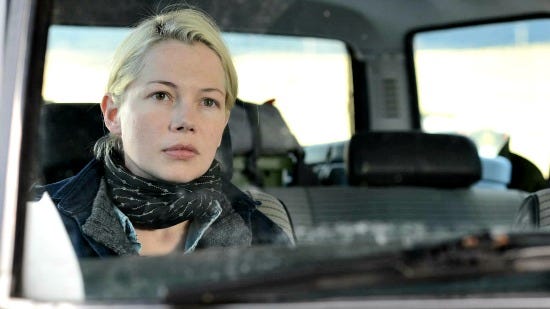Certain Women

I see around 200 movies a year, plenty of good ones, a healthy portion of bad ones, a whole bunch of mediocre ones. What I rarely see these days are movies that are just plain boring.
Say what you will about our current system for making and delivering films to the public — the overemphasis on spectacle, too few indies and foreign movies making it out to the heartland, etc. But there’s almost always something interesting going on in films that get a significant theatrical release, even in the weakest cinematic fare.
I mean, “Jupiter Ascending” was a screaming pile of laughable dog doo-doo. But it wasn’t like I would’ve rather spent the time folding laundry.
I can’t honestly say the same about “Certain Women” — at least, most of it. It’s three disparate stories of women living in Montana, based on the short stories of Maile Meloy. Adapted and directed by Kelly Reichardt, it has three chapters that barely intersect with each other; literally, one character from a section may pass by another, but that’s it.
Like a lot of episodic movies, some parts rise and other parts fall. In this case, the final act is breathtaking in the quiet power of its fragile emotions. The first two are so listless I wondered why anyone thought these stories deserved to be on celluloid.
Let’s be generous and talk about the last one first.
It stars Kristen Stewart and Lily Gladstone as two young women who are drawn to each other. Stewart is Beth, a newly minted lawyer who signed up for a job teaching education law at night school, not realizing it was a four-hour drive away. Gladstone is Jamie, a f’real cowgirl who takes care of horses at a local ranch.
Jamie wanders into the class — she’s not a student; she just saw people going in and was looking for something to do. She was mesmerized by the awkward, honest grace of Beth, and keeps coming back to the class. They hook up for meals at the local diner after class.
Jamie doesn’t really talk much, but Gladstone’s wide, strong face does all the communicating we need. She’s clearly smitten, and uses her limited verbal and emotional vocabulary to let Beth know how she feels.
This section, which feels both workaday and dreamy, reminded me in a lot of ways of “Brokeback Mountain” — not just the same-sex attraction, but how everyday folks have trouble expressing their inner selves.
There’s some of that in the other two acts as well, but it’s far less compelling. Certainly there is not anywhere the emotive resonance of the final section.
Laura Dern plays another lawyer. She’s got a PITA client (Jared Harris), who suffered a devastating on-the-job injury but foolishly signed away any liability for a small settlement. She’s spent eight months explaining to him that their hands are tied, but it’s not until she takes him to consult with an older male attorney that he finally accepts it. On the ride back to town he jokes with her about taking a machine gun to his old job, and we’re not sure where the joke ends and the pain begins.
In the middle piece, Michelle Williams and James Le Gros play a married couple building a house in the woods. They’re currently living in a souped-up tent, and there’s some friction over their parenting styles toward their teen daughter (Sara Rodier). They visit an older man (René Auberjonois) who obviously has dementia and sorta / kinda sweet-talk him out of some sandstone bricks from the old schoolhouse that are lying around his property, which they want to use for their project.
I wish I could say there’s more going on in these parts beyond what I just described, but there isn’t.
“Certain Women” is a terrific short film that is stitched unnecessarily to two far lesser short films. If you can survive the dullness of the first two acts, the third is worth hanging around for.



